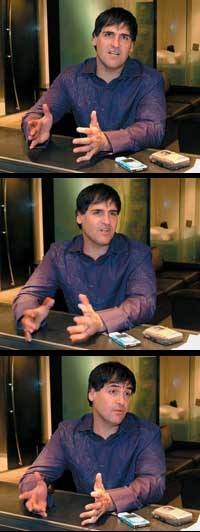The Cuban Revolution Page 4
 No Friend of Bill's The next day, I go to Cuban's house, an estate more akin to Versailles than the typical Dallas McMansion. Not surprisingly, he has a custom-built home theater with a 100-inch screen and a Sony Qualia projector. Seating in the room includes a bed-size ottoman.
No Friend of Bill's The next day, I go to Cuban's house, an estate more akin to Versailles than the typical Dallas McMansion. Not surprisingly, he has a custom-built home theater with a 100-inch screen and a Sony Qualia projector. Seating in the room includes a bed-size ottoman.
Cuban comes bounding in, sans socks and shoes, and ushers me into his messy home office, piled high with discs, tapes, and packages, including one containing an Xbox 360. An HP Media Center PC is connected to a bulky direct-view monitor. Cuban says he never uses the PC's remote, preferring to sit close, sometimes with his bare feet on the desk, as he checks e-mail, Web surfs, and previews movies. Today he's screening Diggers, an HDNet Films production about class-conscious clam diggers coping with gentrification in the Hamptons during the 1970s.
Seeing the Xbox 360 sets him off. Cuban says that Microsoft blew it by not making the game console compatible with either WMV-HD (the high-def video format already in use with Windows Media Player computer software) or the forthcoming HD DVD high-def disc format. Cuban wants to repackage HDNet content on disc (he already sells a few thousand copies that way on D-VHS cassette), and he says he's considering going with Apple's QuickTime instead of WMV-HD.
He rails a lot at Microsoft. Yesterday in the Bunker, I told him that Microsoft and CableLabs, the research arm of the cable-TV industry, had agreed to a specification for putting CableCARDs in future Media Center PCs, which would allow the PCs to receive and record high-def cable channels - not just over-the-air HDTV channels. Cuban's first reaction was, "But will Microsoft dumb it down?" In the meantime, he had done some research and confirmed his worst suspicions.
Millions of people with older HDTVs that don't have one of the new HDMI inputs won't be able to use those sets with CableCARD-equipped PCs, he explains. Why? Because Microsoft will downconvert the resolution from the PC's component-video outputs, which is how most HDTVs get high-def programming. "That is just dumber than a box of rocks," he says. "It's misstep after misstep, and it's a shame. They had a great opportunity with CableCARD, and they're going to blow it."
As usual, it's all about copyright. Manufacturers are designing gear to downrez analog HD signals to stop people from making multiple high-def copies on their computers. Content owners - including Cuban - want to control how programs are played, saved, and distributed. That can only be done with a digital connection like HDMI or FireWire. But Cuban draws the line. "I don't want my content downrezzed. I want to see it the way it was meant to be seen."
| Cuban on ... |
| Broadband "Overhyped. It's not going to grow to the extent people think it is." Hard drives "Why not load them with high-def content and ship them to consumers?" Blu-ray vs. HD DVD "They could be surpassed very quickly by new optical technology or hard drives. If prices fall fast enough, it's over." His favorite movie "One Flew Over the Cuckoo's Nest." À la carte cable channels "The cable companies would have to advertise a lot more to get your attention, and then the price of everything would go way up." |
"The 5-terabyte hard drive you bought for $499 will receive content wirelessly," he says. "And the smart companies will preload content that you can just unlock to buy. The worst quality for the new movies you get will be equivalent to today's HDTV broadcasts. The smart companies will let you buy even better quality. Home theater enthusiasts will pay more for it. Your new HDTV will be 1080p. You won't be able to get an analog set unless it's a closeout, like you buy a 12-inch black-and-white set now. And you'll be able to network everything."
Few people move as effortlessly as Cuban does between the worlds of sports, movies, technology, and business. But by the very way he lives his life, he's pointing toward a future where digital technology lets all of us dabble in as many areas as our talents allow. Most of us won't become as rich as Cuban has, but we'll be indebted to him for paving the way.




























































